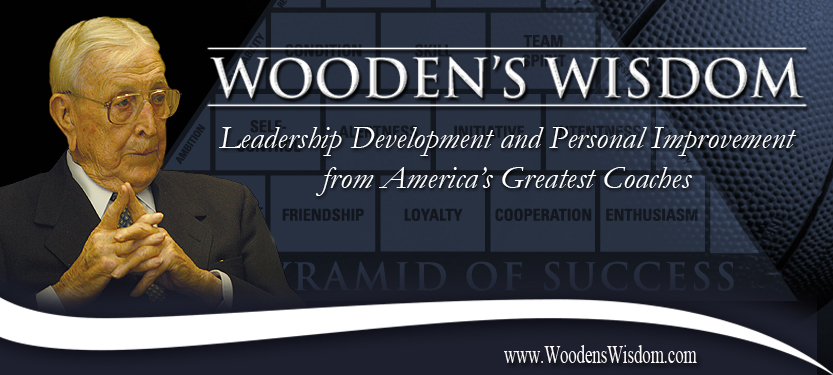 |
|
| Wooden's Wisdom - Volume 1 | Issue 26 |
| Craig Impelman Speaking | Championship Coaches | Champion's Leadership Library Login | |
|
POISE
We will now begin discussing the blocks on the fourth tier on the Pyramid of Success: poise and confidence.
Poise is defined on the Pyramid of Success as: “Just being yourself. Being at ease in any situation. Never fighting yourself.”
“Poise is much like self-control,” Coach Wooden said. “Many people over the years have noticed that and mentioned it to me, but I don't consider the two to be quite the same. I again have my own definition for poise - a very simple definition: ‘Just being yourself.’ When you maintain your poise you’re being yourself. You're not acting. You're not trying to be something you're not. You are yourself therefore you're going to be able to function closer to your own particular abilities.”
Coach Wooden viewed Poise and Confidence as an outgrowth of the twelve blocks below them. He described that relationship as follows: “Let's say if you're industrious,” he said. “If you’re enthusiastic, if you're friendly, if you're loyal, if you're cooperative and if you maintain self-control and if you're alert and alive and observing constantly and if you have initiative and aren’t afraid to fail, knowing quite well that you are imperfect and you are going to fail at times and if you're intent on reaching realistic objectives and attaining poise and confidence and if you conditioned yourself for doing these things and if you work at it and you’re skilled and you can execute not only properly but quickly and if you're imbued with consideration for others - you'll have poise and confidence and it will be true. It will not be false. It will not be whistling in the dark at all.”
If you have poise you will be true to yourself under all circumstances - and “Be true to yourself” was the first item in the seven point creed that Coach received from his father. As Coach himself later stated: “If you sacrifice principle trying to please everyone, you end up pleasing no one.”
In his book Practical Modern Basketball, Coach Wooden describes the importance of a coach being a philosopher in the following manner: “Webster tells us that, among other things, a philosopher is a person who meets all events, whether favorable or unfavorable, with calmness and composure.”
A philosopher has poise.
Coach expanded upon this concept by pointing out additional circumstances under which a coach must keep his or her poise:
But this advice is not true only for coaches; it can be applied to a parent, a supervisor, a friend or any position where we work with others.
Some lines from one of Coach Wooden’s favorite poems “If” by Rudyard Kipling describe the essence of poise quite well:
We all need poise to perform to our potential.
Yours in coaching,
Craig Impelman www.woodenswisdom.com
Twitter: @woodenswisdom
|
CONDITION
If true it is, that I desire,
To be the best that I can be, I’ll “poise” employ to seek and hire, Not someone else, but simply me. Swen Nater
THE COMMON MAN,
JOHN WOODEN He says that he's common, the usual type,
No different than others in grace- Just average, not better or worse than the rest- Just middled and mean in the race. But what is enclosed in so common a man,
Who works the uncommon-like deed? An extraordinary focus on what he believes, And life-long betroth to his creed. Swen Nater
|
|
For more information visit www.woodenswisdom.com |
|
© Copyright 2026 WoodensWisdom.com | # of Times Wooden's Wisdom Issues Opened: 7,838,459
Hosting & Design by:EverydayWebDesign.com